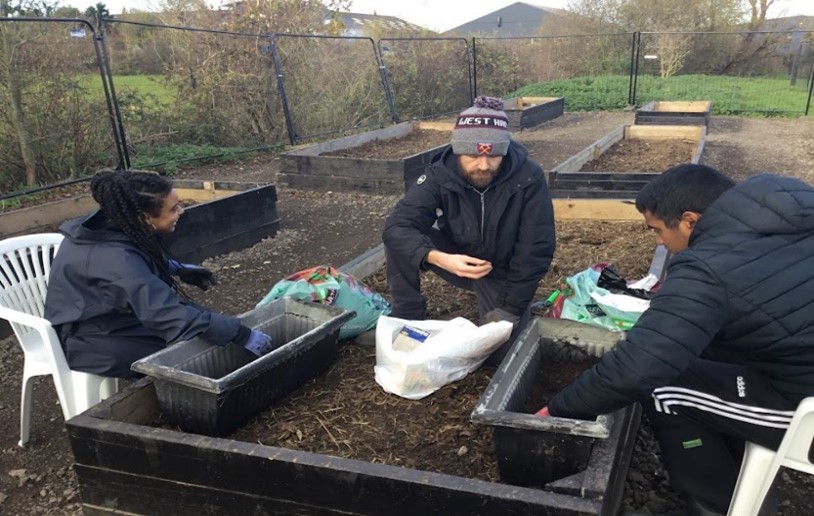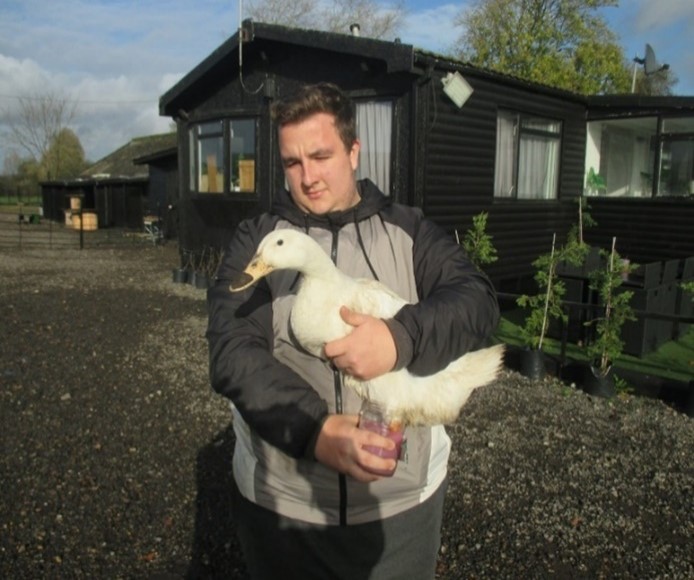Careers Guidance
Whilst at Woodfield School pupils are taught the skills and attitudes required to enable them to become as independent as they can be and to prepare for adulthood. We aim for pupils to have an enriched and stimulating curriculum to give them every opportunity to reach their full potential regardless of their gender, race, learning disability or physical disability.
The Woodfield CEIAG Policy, Woodfield School Providers Access Policy and Woodfield School Student Entitlement can be downloaded below.
Careers is overseen by the Careers Leader Deborah Wood
Our Team is
Careers Advisor: Jaqueline Ashley, jas@compasslp.co.uk, 0300 303 0610
Assistant Head Teacher (KS4 &5): Suneeta Deorukhkar, sde@compasslp.co.uk, 0300 303 0610
Careers Lead: Chetna Patel, cpa@compasslp.co.uk, 0300 303 0610
Deputy Head Teacher: Deborah Wood, dwo@compasslp.co.uk, 0300 303 0610
The governor overseeing careers at Woodfield is Jerry Meldrum, jme@compasslp.co.uk, 0300 303 0610
If you have any questions about the Careers guidance and Education at Woodfield, please contact Deborah or a member of the team.
To measure and assess our careers development program the school has used the Compass Evaluation Toolkit, SEND Gatsby Benchmark Toolkit and is currently undertaking the Quality in Careers Standard
We review the information on this page every September
Rationale and commitment to careers education, information, advice and guidance
At Woodfield School careers education, information, advice and guidance is at our forefront ensuring pupils’ leave with the right tools and values to help prepare them for adulthood. We support students to consider their future options, realise their potential and decide how their skills and experiences fit with opportunities in the job market. We prepare students for their preferred transitional pathway whether that is to continue with further education, employment, training or living independently and we use a person-centred approach in our delivery method. We are fully committed to our statutory and moral obligation to provide a holistic careers service to students identified in Year 7 onwards, highlighting the vocational and academic routes to their preferred careers path. We ensure that pupils are inspired and motivated for the world of world, ensuring high achievable aspirations are considered for a range of careers available. Our Careers Strategy works in line with our PSHE delivery.
We all share the belief that many of our pupils are capable of sustaining paid employment with the right preparation and support.
In conjunction with the Brent Connexions, (prospects), our careers advisor Jacqui works with pupils, parents’ and Woodfield staff on site three days a week. This excellent collaboration has meant we:
- Provide learners, staff and external agencies the required resources and links that will enable them to make informed decisions about their future pathways.
- Have an established programme of observations and meetings with pupils KS3, KS4 and KS5 to compile profiles
- Have established links with parents/carers through parents’ evenings, parent coffee mornings, PLP days and annual review meetings
- Deliver, though Connexions, impartial Careers Information Advice and Guidance that is independent of the school, thereby meeting the School’s Statutory obligations in accordance with the Education Act 2011.
- Have an established programme of information events – Branching Out, What’s Next and Mentoring program post Woodfield School through Connextions and The Shaw Trust.
- Have stablished links and cohesive documentation with external agencies in the transition process – SENAS, Colleges, FE providers
- Provide learners with current and relevant information to career pathways in education, apprenticeships and the world of work
- Conduct One to One Guidance Interviews with all pupils from year 9 and provide more sessions for our leavers
- Write thorough and comprehensive Transition plans
- Write thorough and comprehensive action plans
We also work with Talentino, Skills Builder and The Shaw Trust to ensure the best possible careers advise, guidance and training for our pupils.
|
1. Self-awareness Describe yourself, your strengths and preferences Be able to identify skills and attributes Learning about people's different Skills and attributes. 2. Self-determination My PFA Portfolio Practical work-related learning in school. Keep a work log with reflections and things to improve. 3. Self-Improvement as a learner Pupils take charge of conducting an interview with a visitor and feedback to the visitor what they have learnt from the answers to their questions. 4. Exploring careers and career development Talk/write about what they have gained from going on a visit to a workplace or engaging with an employee. ‘Who am I?’ quiz. The teacher reveals ten clues, one at a time, about the career of someone known to the children. Visits to various workplaces and discussions with employees.
|
Working in a Cafe
Horticulture |
|
Animal Care
Maintenance |
5. Investigating work and working life Pupils to research and give examples of different kinds of work. Pupils explore the similarities and differences between paid work, voluntary work. supported work and work in the home. Pupils explore the purpose of work (why do people need/want to work? Looking at appropriate clothing for different types of jobs: uniforms/’business attire, overalls etc…. 6. Understanding business and industry describe a local business and the services it provides. Pupils complete a project (different from KS3 project) on shops and businesses in the community with inputs from owners and staff who work in them. 7. Investigating jobs and labour market information (LMI) Pupils to be aware of what labour market information (LMI) is and how it can be useful to them. Look and find local job vacancies using job vacancy websites/apps/newspapers and other sources. 8. Valuing equality, diversity and inclusion To be able to recognise the harm caused by stereotyping and discrimination and the importance of treating people fairly. Bullying in the workplace and consequences of bullying. |
9. Learning about safe working practices and environments
Learning about Health and Safety in the workplace.
10. Making the most of careers information, advice and guidance
Patsy and Jackie (Woodfield) to carry out a class presentation and session on their roles and how they are here to support individuals. What is impartial careers advice?
Presentations and sessions with visiting professionals to gather careers information. Careers week (parents and other members of the public to carry out talks about their jobs)
11. Preparing for employability
Pupils show how they are developing the qualities and skills which will help them to improve their employability chances. Pupils practise filling out the sections on sample application forms. CV writing workshops. Interview role plays. Moving on to mock interviews with unfamiliar people. Weekly work placements.
12. Showing initiative and enterprise
Plan and organise an enterprise project for sale at enterprise day
13. Developing personal financial capability
To be able to show that you can manage your own budget and contribute to household budgets Pupils take part in a simulation that challenges them to manage a household budget. Practice these skills in a real-life shopping environment.
14. Identifying choices and opportunities
Research possible and realistic jobs and the qualifications and pathways needed to be able to do this job.
15. Planning and deciding
Using the information from the Spring term, make a learning plan. What courses need to be researched and looked into?
16. Handling applications and selection: Promoting themselves in a way that attracts the attention of selectors and recruiters, as well as managing the applications process, requires that individuals develop a range of self-presentation and marketing skills including the use of digital and social media. This also requires that they develop strategies to cope with setbacks and disappointment
17. Managing changes and transitions: Transition confidence and preparedness help individuals to make successful moves such as changing schools, going to university or starting an apprenticeship or employment. Reviewing and reflecting on previous transitions can help individuals to develop the psychological resources to cope with future transitions
Preparation for work
We currently have all pupils in KS4&5 in weekly work placements or work-related learning
Key Stage 4
|
Placement |
Pupil numbers |
|
Site maintenance (external on Pages Farm) |
9 |
|
Animal Care and Cattery (external on Pages Farm) |
10 |
|
Horticulture (external on Pages Farm) |
5 |
|
The eggs business (external on Pages Farm) |
4 |
|
Red Brick Café (external) 4&5 |
5 |
|
Sufra food bank and community gardens (external) 4&5 |
3 |
|
Catering and hospitality |
11 |
|
Health and Beauty |
5 |
|
Media |
10 |
|
Fashion design 4&5 |
2 |
|
TA (Village School/ Woodfield KS3) |
1 |
Key Stage 5
|
Placement |
Pupil numbers |
|
Site maintenance (external on Pages Farm) |
7 |
|
Animal Care and Cattery (external on Pages Farm) |
6 |
|
Horticulture (external on Pages Farm) |
2 |
|
The eggs business (external on Pages Farm) |
5 |
|
Catering and hospitality |
6 |
|
Health and Beauty |
5 |
|
Media |
4 |
|
Sports leaders |
2 |
|
Music and the development of Radio Woodfield |
8 |
|
Librarian |
2 |
|
Administration |
1 |
1 pupil- 2 day placement as part of his personalised curriculum:
|
Plumbing (External) |
1 |
3 pupils have a personalised programme:




